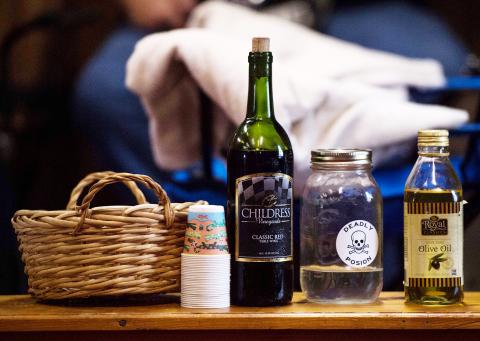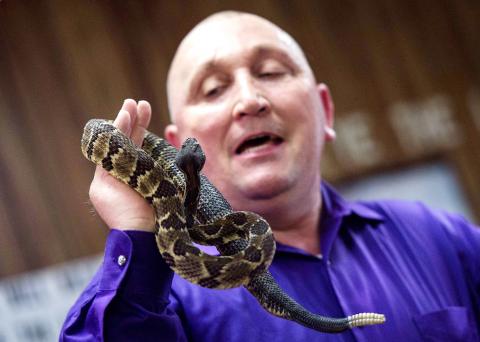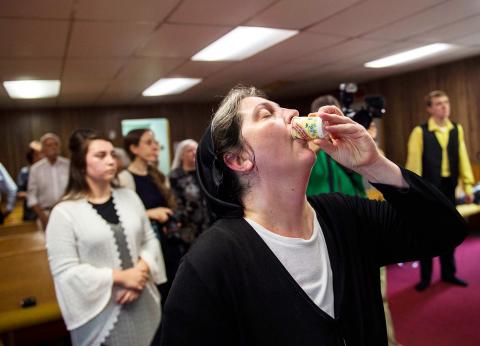The tiny community of Squire, West Virginia, near a coal mine in the Appalachian mountains is made up of a few scattered houses, a car wash, and one of the few remaining Pentecostal Signs churches.
With old fashioned apostolic gospel music echoing through the small wooden building, members of the congregation dance and spin in a trance as Pastor Chris Wolford reaches into a box and pulls out a three-foot long timber rattlesnake, a test of faith.
Swinging the snake over his shoulder he proclaims that God is present, and allows the snake to move around in his hands, before laying it across the lap of another worshipper playing the guitar.

Photo: AFP
Serpent-handling Christians believe taking up snakes, as well as drinking poison and applying flames to themselves is something they are commanded to do.
They take their scriptural mandate from the Bible’s Gospel of Mark 16: 17-18, “In my name they will drive out demons; they will speak in new tongues; they will pick up snakes with their hands; and when they drink deadly poison, it will not hurt them at all.”
“Now we don’t believe that they won’t bite us,” Wolford says. “We know every time we go in the box that there may be a chance that we may get bit, and that we may die. But see, when I got saved, when I got in this, he put something in me that, to live for me is for God, and to die is for God.”

Photo: AFP
Thirty to 40 worshippers came from all over West Virginia and nearby states for the special Memorial Day service, in honor of Chris’s brother, Randy “Mack” Wolford, who was the previous pastor but died of a rattlesnake bite, his fourth, on the same weekend in 2012. Their father, too, was a pastor and died of a snake bite when Chris was only young. West Virginia is the last remaining state where serpent-handling is legal.
According to William Dinges, Ordinary Professor of Religion and Culture at Catholic University, “the act of taking up serpents is not something that is endorsed by any denomination.”
“As far as the snake handling churches are concerned, what they do, even though this is disowned by other religious bodies, they believe this is a very clear biblical mandate by way of their literal reading of the scriptures.”

Photo: AFP
Services build like concerts with the music growing into a frenzy of activity with drums, slide guitars, and keyboards telling the congregation when to get to their feet and call out in worship.
Serpent-handling only plays a small part of the service, some of which last almost four hours. The rest of the time members proclaim their faith, dance, preach, and take communion.
Traditionally kept within the family, many members of the faith are related or closely connected. A few outsiders trickle in and some have become followers as well, but overall it feels like an extended family.
There are an estimated 125 serpent-handling churches left. The movement is currently in decline, but it has waxed and waned over its 100-year history, and since the tradition is passed down from one generation to the next, it is likely to stay alive for many years to come.

June 2 to June 8 Taiwan’s woodcutters believe that if they see even one speck of red in their cooked rice, no matter how small, an accident is going to happen. Peng Chin-tian (彭錦田) swears that this has proven to be true at every stop during his decades-long career in the logging industry. Along with mining, timber harvesting was once considered the most dangerous profession in Taiwan. Not only were mishaps common during all stages of processing, it was difficult to transport the injured to get medical treatment. Many died during the arduous journey. Peng recounts some of his accidents in

“Why does Taiwan identity decline?”a group of researchers lead by University of Nevada political scientist Austin Wang (王宏恩) asked in a recent paper. After all, it is not difficult to explain the rise in Taiwanese identity after the early 1990s. But no model predicted its decline during the 2016-2018 period, they say. After testing various alternative explanations, Wang et al argue that the fall-off in Taiwanese identity during that period is related to voter hedging based on the performance of the Democratic Progressive Party (DPP). Since the DPP is perceived as the guardian of Taiwan identity, when it performs well,

A short walk beneath the dense Amazon canopy, the forest abruptly opens up. Fallen logs are rotting, the trees grow sparser and the temperature rises in places sunlight hits the ground. This is what 24 years of severe drought looks like in the world’s largest rainforest. But this patch of degraded forest, about the size of a soccer field, is a scientific experiment. Launched in 2000 by Brazilian and British scientists, Esecaflor — short for “Forest Drought Study Project” in Portuguese — set out to simulate a future in which the changing climate could deplete the Amazon of rainfall. It is

Artifacts found at archeological sites in France and Spain along the Bay of Biscay shoreline show that humans have been crafting tools from whale bones since more than 20,000 years ago, illustrating anew the resourcefulness of prehistoric people. The tools, primarily hunting implements such as projectile points, were fashioned from the bones of at least five species of large whales, the researchers said. Bones from sperm whales were the most abundant, followed by fin whales, gray whales, right or bowhead whales — two species indistinguishable with the analytical method used in the study — and blue whales. With seafaring capabilities by humans